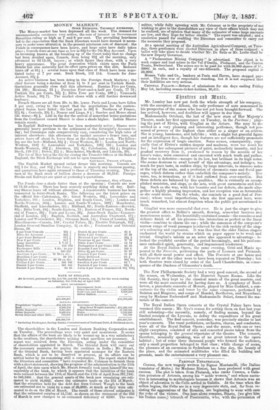tiratrts an :41usir.
Mr. Lumley has now put forth the whole strength of his company, with the exception of Alboni, the only performer of note announced in his prospectus of the season who has not yet been brought forward. She has arrived, however, and doubtless will appear in due time.
Mademoiselle Ortolani, the last of the new stars of Her Majesty's Theatre, made her first appearance on Tuesday, in the Puritan!; playing the part of Elvira, with Giuglini as the Arturo. She may be de
scribed as a very pleasing and interesting performer, though not possessed of powers of the highest class either as a singer or an actress.
She is young, handsome, and ladylike ; with a slight but graceful figure and an intelligent face' though her features are not sufficiently prononces for the expression of tragic emotion. Some scenes, consequently, especially that of Elvira's sudden despair and madness, were too much for her ; but her subsequent pictures of quiet, melancholy insanity, and her gradual recovery from it, awakened to reason by the accents of her lover's voice, were conceived and executed with much truth and pathos. Her voice is defective—meagre in its low, but brilliant in its high notes. She seems desirous to avail herself of this advantage' and indulges, too much for pure taste, in sudden skips, by large intervals, to staccato notes at the top of the scale, and a profusion of chromatic runs and florid passages, which deform rather than embellish the composer's melody. Her voice, too, is tremulous, as if it had suffeeed from over-exertion. But these defects are balanced by fine qualities. She is evidently an accomplished musician and sings, as she acts, with great earnestness and feeling. Such as she was, with her beauties and her defects, she made altogether a highly pleasing impression, and her reception was as favourable as she could desire. On the whole, she reminds us a good deal of Persiani ; whose vocal imperfections, when she first appeared here, were much remarked, but almost forgotten when the public got accustomed to them.
Giuglini was more successful that ever. He is just the singer to give the greatest effect to Bellini's smooth, flowing, somewhat luscious and monotonous music. His beautifully-sustained sounds—the roundness and delicate finish of all his phrases—his intonation as perfect as the finest violin—combine to charm the ear ; while the sameness of the composer's narrow range of vocal passages is relieved by the rich variety of the singer's colouring and expression. It was thus that the older Italian singers enchanted the world by strains which on paper appear to be weak and trivial. Giuglini's talents as an actor also appeared to advantage : he looked the youthful cavalier of the period becomingly, and his performance embodied spirit, generosity, and impassioned tenderness.
At the Royal Italian Opera, the same evening, Grisi and Mario appeared in the Favorites, performing the parts of Leonora and Fernando with all their-usual power and effect. The Trarkta at one house and the Favorites ae the other were to have been repeated on Thursday ; but both theatres were closed by order of the Lord Chamberlain, in consequence of the Duchess of Gloucester's death.
The New Philharmonic Society had a very good concert, the second of the season, on Wednesday, at the Hanover Square Rooms. Like the Old Society, they kept to the classical music of the great masters, and were all the more successful for having done so. A symphony of Beethoven, a pianoforte concerto of Mozart, played by Miss Goddard, a concertante for the violin and tenor by the same composer, performed by Sainton and Blagrove, and songs of Handel, Beethoven, and hfeyerbeer, sung by Madame Rudersdorff and Mademoiselle Solari, formed the materials of tho concert.
The Royal Italian Opera concerts at the Crystal Palace have been resumed this season ; Mr. Gye's reason for setting them on foot last year still subsisting—the necessity, namely, of finding means, beyond the limited receipts of the Lyceum, to defray the expenditure of his great establishment. The first concert, yesterday, was precisely similar to last year's concerts. The vocal performers, orchestra, chorus, and conductor, were all of the Royal Italian Opera ; and the music, with one or two slight exceptions, consisted of airs and concerted pieces taken front the operas belonging to the present repertoire of the theatre. The concert, therefore, musically speaking, was of no great interest to the opera habitué; but of some three thousand people who formed the audience, only a small proportion belonged to that class ; while change of scene, the pleasure of an excursion to Sydenham on a fine day, the beauty of the place, and the animated multitudes who filled the building and grounds, made the entertainment a very pleasant one.


































 Previous page
Previous page